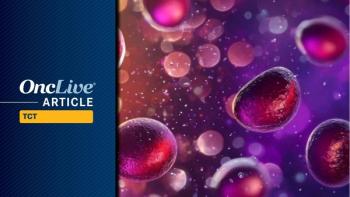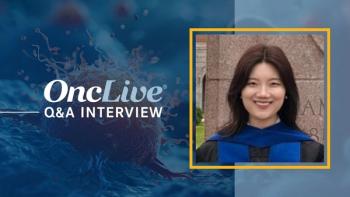
CAR T-Cell Therapy and the Future Management of MCL
Transcript:
Michael Wang, MD: Chemotherapy and chemotherapy-free therapies include the best combinations of ibrutinib and acalabrutinib-zanubrutinib. They cannot cure a patient now using CAR [chimeric antigen receptor] T-cell therapies. Cell therapies, CAR T-cell therapy—what is involved? You take the patient’s own blood, you draw them, you take the T cells, you put it in the lab, and then you use a vial to carry your virus. That’s not harmful, but it can carry a gene into the cell and transfer the T cells, so the gene gets expressed on top of the T cell. This is the chimeric antigen receptor. This chimeric goes into the antigen. The antigen is on the lymphoma cells. Now you get the chimeric antigen, and the T cells are able to recognize these lymphoma cells. But before you do that, you amplify these CAR T cells, chimeric antigen T cells, then you put it back. Not only can the T cells recognize the lymphoma cells or the tumor cells, but they can also outnumber them. This is the best therapy. Even the very harsh lymphomas we can now treat. They zoom through chemotherapy. You give them all the targeted therapies. They just grow the monster lymphomas, and boom—we can kill it with cell therapy.
For mantle cell lymphoma, this afternoon I’m going to present the ZUMA-2 study, and it’s a huge event, very anticipated, especially by our patients and their families. Mantle cell lymphoma is very rare. Large cell lymphoma is very common, so the CAR T-cell therapy for large cell lymphoma was approved 2 years ago. While the large cell lymphoma is benefiting, a lot of patients are in remission. The mantle cell lymphoma patients sometimes don’t make it. I feel the pressure; they feel the pressure; everybody feels the pressure. This presentation, which is very connected with FDA approval, is a much-anticipated event.
Actually, we already published the abstract for this ASH American Society of Hematology Annual Meeting & Exposition. The response rate is already over 80%. The CR complete response rate is only 53%—we already have 60 patients. In the abstract, we can describe only 28 patients, and 28 patients were already fantastic. At my presentation I will describe the 460 patients.
Chemotherapy, targeted therapy, we are in this era. How about in the future? What if some of the CAR T-cell therapies and these 3 modalities cannot cure them? In the future, we are looking into the precision medicine era. I am very proud that I have been the co-principal investigator on The University of Texas MD Anderson Cancer Center Moon Shot project on B-cell lymphoma for the past 5 years. We are using chemotherapy, targeted therapy, immunotherapy, cell therapies, CAR T-cell therapies—cell therapy is not only CAR T. We developed within the Moon Shot CAR NK natural killer cell therapies, which were very good. The direction we’re heading to is a precision medicine era.
In a few years after CAR T-cell therapy, we’re looking at precision medicine. What is the precision? We sequence all the tumors. We not only sequence but include the DNA, RNA, proteomics, epigenetics. We also study the biological mechanism of each patient. Why they are resistant to all these therapies.
Using all the sequence data, biological mechanism, the best technology, we could decipher and then find our Achilles’ heel of each resistant tumor and then kill that, attack that Achilles’ heel with the precise medicine that’s needed there. We do not need to use so many. That is the future of the precision medicine era. There is has never been a better time to be an academic hematologist. It is never a good time to be diagnosed with a lymphoma, but this area is growing so much, and it is very exciting. I wake up every morning very excited.
Transcript Edited for Clarity




































